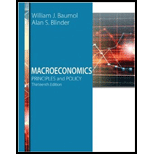
To ascertain: The velocity of each year and comparison of trend.
Explanation of Solution
Calculation of velocity of money
According to Fisher's quantity theory of money, the demand for money and supply of money can be written as follows:
Where,
M = Money supply
V = Velocity of money
P = General Price level
Y = Total output
MV refers to the supply of money and PY refers to the demand for money.
To calculate the velocity of money, Equation (1) can be written as follows:
ln Equation (2), PY refers to
United States money supply and GDP The following table shows the money supply and GDP of the United States for different years.
Table (1)
| Year | Money Supply | GDP |
| 2006 | 1,367 | 13,399 |
| 2007 | 1,375 | 14,062 |
| 2008 | 1,602 | 14,369 |
| 2009 | 1,697 | 14,119 |
United States velocity of money in the year 2006
Substitute the 2006 money supply and GDP in Equation (3) to obtain the velocity of money for the United States. This can be written as follows:
Hence, the velocity of money for the United States in the year 2006 was 9.8
United States velocity of money in the year 2007
Substitute the 2007 money supply and GDP in Equation (3) to obtain velocity of money for the United States. This can be written as follows:
Hence, the velocity of money for the United States in the year 2007 was 10.23
United States velocity of money in the year 2008
Substitute the 2008 money supply and GDP in Equation (3) to obtain velocity of money for the United States. This can be written as follows:
Hence, the velocity of money for the United States in the year 2008 was 8.97
United States velocity of money in the year 2009
Substitute the 2009 money supply and GDP in Equation (3) to obtain velocity of money for the United States. This can be written as follows:
Hence, the velocity of money for the United States in the year 2009 was 8.32
United States money supply, GDP, and velocity of money
The following table shows the United State's money supply, GDP, and velocity of money for different years.
Table (1)
| Year | Money Supply | GDP | Velocity |
| 2006 | 1,367 | 13,399 | 9.8 |
| 2007 | 1,375 | 14,062 | 10.23 |
| 2008 | 1,602 | 14,369 | 8.97 |
| 2009 | 1,697 | 14,119 | 8.32 |
From the above table, it is observed that there is a continuous sharp decreasing trend in velocity of money during 2006 to 2009 except for the year 2007.
United States money supply, GDP, and velocity of money
The following table shows the United State's money supply, GDP, and velocity of money for different years.
Table (2)
| Year | GDP | M1 Money Supply | V=GDP/M |
| 1975 | 1,663.70 | 287.10 | 5.79 |
| 1976 | 1,824.10 | 306.20 | 5.96 |
| 1977 | 2,030.10 | 330.90 | 6.14 |
| 1978 | 2,293.80 | 357.30 | 6.42 |
| 1979 | 2,562.20 | 381.80 | 6.71 |
| 1980 | 2,788.10 | 408.50 | 6.83 |
| 1981 | 2,126.80 | 436.70 | 4.87 |
| 1982 | 3,253.20 | 474.80 | 6.85 |
| 1983 | 3,534.60 | 521.40 | 6.78 |
| 1984 | 3,930.90 | 551.60 | 7.13 |
| 1985 | 4,217.50 | 619.80 | 6.80 |
| 1986 | 4,460.10 | 724.70 | 6.15 |
| 1987 | 4,736.40 | 750.20 | 6.31 |
| 1988 | 5,100.40 | 786.70 | 6.48 |
| 1989 | 5,482.10 | 792.90 | 6.91 |
| 1990 | 5,800.50 | 824.70 | 7.03 |
| 1991 | 5,992.10 | 897.00 | 6.68 |
| 1992 | 63,420.30 | 1,024.90 | 61.88 |
| 1993 | 6,667.40 | 1,129.60 | 5.90 |
| 1994 | 7,085.20 | 1,150.60 | 6.16 |
| 1995 | 7,414.70 | 1,127.50 | 6.58 |
Comparison of velocity of money between 1975 to 1985 and 2006 to 2009
During 2006 to 2009, there is a consistent fall in velocity of money, whereas during 1975 to 1985, the velocity of money shows a mixed trend, that is, there is no consistency in trend.
Introduction:
Definition of M1
M1 money refers to the total amount of money in the circulation and savings with banks and other saving institutions.
Velocity of money
Velocity of money refers to how many times the total money supply circulated in the economy in a given period of time.
Want to see more full solutions like this?
Chapter 15 Solutions
Macroeconomics: Principles and Policy (MindTap Course List)
- A standard "money demand" function used by macroeconomists has the form In(m) = Po + B₁In(GDP) + B₂R, Where m is the quantity of (real) money, GDP is the value of (real) gross domestic product, and R is the value of the nominal interest rate measured in percent per year. Supposed that B₁ = 2.32 and B₂ = -0.02. What is the expected change in m if GDP increases by 9%? The value of m is expected to by approximately %. (Round your response to the nearest integer)arrow_forwardHow would a doubling of velocity affect Real and Nominal GDP, assuming the money supply doesn’t changearrow_forwardDefine velocity of money and discuss the major determinants of velocity.arrow_forward
- (b) Assume that a country’s nominal GDP was measured at $1500 billion in a year and the volume of money (i.e. M1) circulating in the economy the same year was $400 billion. Using the equation of exchange, determine the velocity of money during the year.arrow_forwardIf the money supply increases by 7%, the price level by 2%, and the real output by 6%, then according to the equation of the quantitative theory of money, the velocity of money increases by:arrow_forwardSuppose the velocity of money decreased from 1.5 to 1.3. Velocity of M2 2.0 1.9 1.8 1.7 1.6 1.5 1960 Recession % Average 1965 1970 1975 1980 Ratio of GDP to M2 1985 M 1990 YEAR 1995 By what percent would M have to increase in order to fully offset this decrease in V? Instructions: Enter your response as a percentage rounded to one decimal place. 2000 2005 2010 2015 2020arrow_forward
- A standard "money demand" function used by macroeconomists has the form In(m)=Bo+B₁In(GDP) + B₂R, Where m is the quantity of (real) money, GDP is the value of (real) gross domestic product, and R is the value of the nominal interest rate measured in percent per year. Supposed that B₁ = 1.51 and ₂ = -0.07. What is the expected change in m if GDP increases by 6%? The value of m is expected to (Round your respon by approximately %. ger) increase decreasearrow_forwardDo not type in dollar signs or round any of your answers. In year one, the money supply (M) is equal to 500, the velocity of money (V) is 5, and the price level is 1.0. According to the equation of exchange, in year 1, nominal and real GDP are both equal to In year 2, the money supply is increased to 530.4 and velocity is unchanged. If the economy grew at the rate of 4 percent, real GDP in year 2 is equal to while nominal GDP in year 2 is equal to As a result of the Fed's decision to increase the money supply from 500 to 530.4, the price level rose from 1.0 to indicating that the inflation rate was percent.arrow_forwardAssume GDP is currently $10,850 billion per year and the quantity of money is $833 billion. What is the velocity of money?arrow_forward
- You are the new Governor of State Bank of Pakistan after Reza Baqir. For each of the situations listed below, decide if you would use Easy-Monetary policy or Tight-Monetary policy. (150 words.) Scenarios: RGDP dropped from 3 percent to 1 percent in the last year. The CPI and GDP deflator have risen 3 percent in the last six months. Commercial interest rates are rising, but the SBP has not raised rates. RGDP is growing steadily, and prices are rising sharply. The Pakistan is experiencing both high inflation and high unemployment. We are in a recession. Factory orders are down, and the economy appears to be slumping. Unemployment is low and prices are rising steadily. Unemployment rates are pushing 11 percent while the CPI has fallen from 8 percent to 2 percent growth. We are in a recession but are experiencing high inflation. The money supply appears to be tight, and prices are on the rise.arrow_forwardIf velocity (V) and aggregate output (Y) remain constant at $4 and $1,250 billion, respectively, what happens to the price level (P) if the money supply (M) declines from $500 billion to $400 billion? Originally, the price level is (Round your response to two decimal places.)arrow_forwardConsider a simple economy that produces only pies. The following table contains information on the economy's money supply, velocity of money, price level, and output. For example, in 2018, the money supply was $360, the price of a pie was $9.00, and the economy produced 800 pies. NOTE: for YEAR 2019, Price Level (Dollars), the choices are (0.47 OR 9.00 OR 9.45 OR 0.50) nominal GDP options for YEAR 2018 are (85.00 OR 7,560.00 OR 7,200.00 OR 89.00) nominal GDP options for YEAR 2019 are (89.00 OR 85.00 OR 7,560.00 OR 7,200.00 ) NOTE: The money supply grew at a rate of _________ (2.44% OR 1.13% OR 5% OR 105%) from 2018 to 2019. Since pie output did not change from 2018 to 2019 and the velocity of money _______ (increased OR decreased OR remained the same), the change in the money supply was reflected ________ (partially OR entirely) in changes in the price level. The inflation rate from 2018 to 2019 was ________ (5% OR 2.44% OR 105% OR 1.13%)arrow_forward
 Macroeconomics: Principles and Policy (MindTap Co...EconomicsISBN:9781305280601Author:William J. Baumol, Alan S. BlinderPublisher:Cengage Learning
Macroeconomics: Principles and Policy (MindTap Co...EconomicsISBN:9781305280601Author:William J. Baumol, Alan S. BlinderPublisher:Cengage Learning
